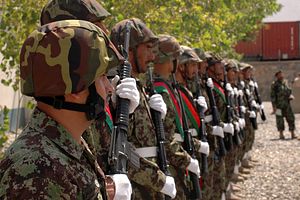Peace always hangs on a slim thread in Afghanistan. The daring attack on the Afghan parliament earlier this week further shreds that thread and raises questions over the future of peace talks between the Afghan government and the Taliban.
Just over a week ago, Taliban representatives engaged members of the Afghan government and civil society in a dialogue in Norway. In the last few months, several informal engagements have taken place between the Taliban and the government’s interlocutors.
However, these months of peace talks have been accompanied by a rise in the aggression of the Taliban. Today, the situation in some provinces, like Helmand and Kunduz, has reached a tipping point.
The attack on the Afghan parliament on Monday is an extension of the Taliban’s so-called ‘spring offensive’ and a serious challenge to the authority of the unity government in Kabul. The offensive puts the Afghan regime in a serious quandary over whether it should continue talks with the Taliban.
“No doubt a big question mark arises about the intention of the Taliban to talk and enter into a peace agreement,” says Fawzia Koofi, a parliamentarian who was present inside the parliament when the attack took place.
Some senior Afghanistan watchers wonder about division in the Taliban ranks. There is a possibility that not all Taliban groups agree with the talks.
“The way there is a fragmentation in the Afghan administration about the talks, similarly the Taliban is also divided: some groups want talks and some not,” opines Bette Dam, a senior journalist and the author of A Man and His Motorcycle: How Hamid Karzai Came to Power.
Speaking with The Diplomat, Dam says that “those men who are involved in the talks, including Tayab Agha, a senior Taliban leader, are serious about dialogue and they hope that the violence will come to an end.”
People now openly question President Ashraf Ghani’s decision to engage Pakistan and embrace it as a close strategic ally in Kabul’s search for peace. There was a widespread expectation that Islamabad would rein in the Taliban, which are under its influence, but this has not happened. Instead, ironically, Afghanistan’s intelligence agency has blamed an officer in Pakistan’s intelligence agency for helping the Taliban plan the attack on the parliament.
What was Ghani aiming to achieve by engaging Pakistan and making it part of the peace process?
“Perhaps Ghani wanted to use the services of Islamabad to wean away the factions of the Taliban in Pakistan which want peace,” Dam notes. She further says that “the major confusion arises because of the perception that the Taliban is a monolithic group. It is not the case. Some are closer to the ISI than others. Also, the ISI itself is divided. Some within it want peace and others don’t. That makes the situation difficult for talks.”
In the meanwhile, the Taliban’s growing presence in the northern province of Kunduz has alarmed the administration in Kabul. There is a real danger of the capital city of the province falling into the hands of Taliban insurgents. If that happens, the credibility of Ghani’s administration will be further undermined.

































